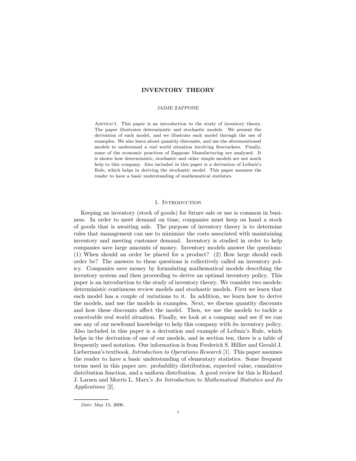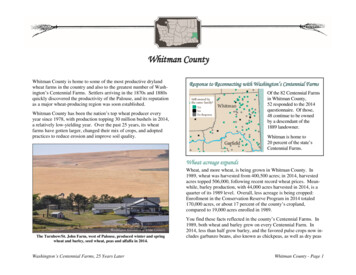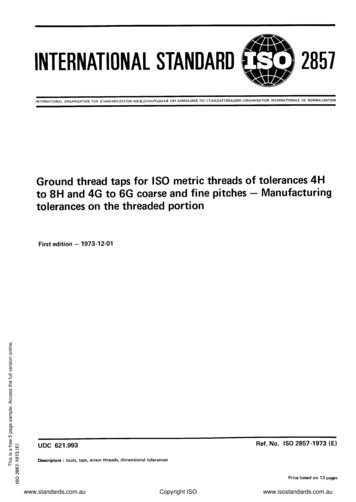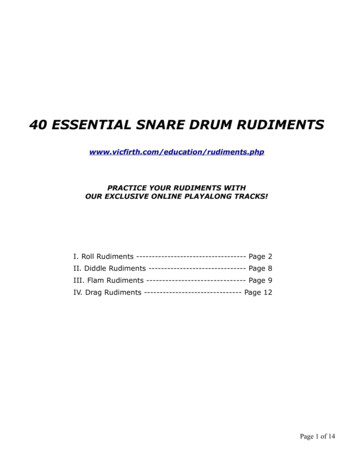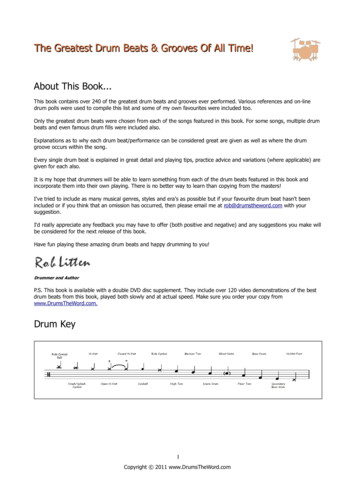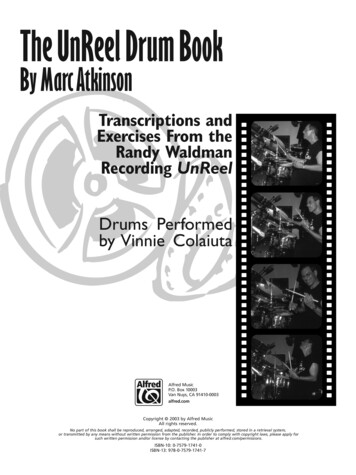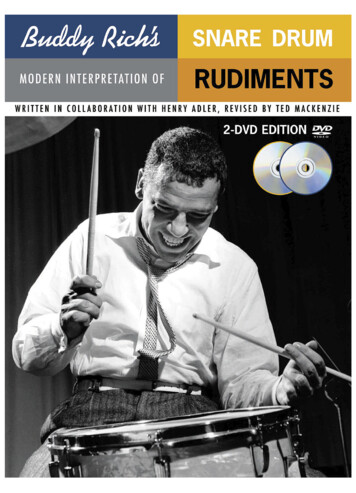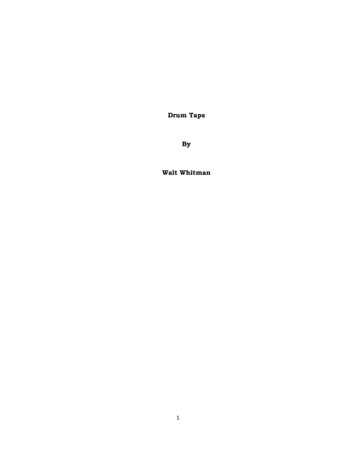
Transcription
Drum TapsByWalt Whitman1
CONTENTSINTRODUCTIONFIRST O SONGS FOR A PRELUDEEIGHTEEN SIXTY-ONEBEAT! BEAT! DRUMS!FROM PAUMANOK STARTING I FLY LIKE A BIRDSONG OF THE BANNER AT DAYBREAKRISE O DAYS FROM YOUR FATHOMLESS DEEPSVIRGINIA--THE WESTCITY OF SHIPSTHE CENTENARIAN'S STORYCAVALRY CROSSING A FORDBIVOUAC ON A MOUNTAIN SIDE2
AN ARMY CORPS ON THE MARCHBY THE BIVOUAC'S FITFUL FLAMECOME UP FROM THE FIELDS FATHERVIGIL STRANGE I KEPT ON THE FIELD ONE NIGHTA MARCH IN THE RANKS HARD-PREST, AND THE ROAD UNKNOWNA SIGHT IN CAMP IN THE DAYBREAK GRAY AND DIMAS TOILSOME I WANDER'D VIRGINIA'S WOODSNOT THE PILOTYEAR THAT TREMBLED AND REEL'D BENEATH METHE WOUND-DRESSERLONG, TOO LONG AMERICAGIVE ME THE SPLENDID SILENT SUNDIRGE FOR TWO VETERANS3
OVER THE CARNAGE ROSE PROPHETIC A VOICEI SAW OLD GENERAL AT BAYTHE ARTILLERYMAN'S VISIONETHIOPIA SALUTING THE COLOURSNOT YOUTH PERTAINS TO MERACE OF VETERANSWORLD TAKE GOOD NOTICEO TAN-FACED PRAIRIE-BOYLOOK DOWN FAIR MOONRECONCILIATIONHOW SOLEMN AS ONE BY ONEAS I LAY WITH MY HEAD IN YOUR LAP CAMERADODELICATE CLUSTER4
TO A CERTAIN CIVILIANLO, VICTRESS ON THE PEAKSSPIRIT WHOSE WORK IS DONEADIEU TO A SOLDIERTURN O LIBERTADTO THE LEAVEN'D SOIL THEY TROD5
INTRODUCTIONWhen the first days of August loured over the world, time seemed tostand still. A universal astonishment and confusion fell, as upon a flockof sheep perplexed by strange dogs. But now, though never before was aSt. Lucy's Day so black with "absence, darkness, death," Christmas isgone. Spring comes swiftly, the almond trees flourish. Easter will soonbe here. Life breaks into beauty again and we realize that man may bringhell itself into the world, but that Nature ever patiently waits to behis natural paradise. Yet still a kind of instinctive blindness blots outthe prospect of the future. Until the long horror of the war is gone fromour minds, we shall be able to think of nothing that has not for itsbackground a chaotic darkness. Like every obsession, it gnaws at thought,follows us into our dreams and returns with the morning. But there havebeen other wars. And humanity, after learning as best it may their brutallesson, has survived them. Just as the young soldier leaves home behindhim and accepts hardship and danger as to the manner born, so, when hereturns again, life will resume its old quiet wont. Nature is not idleeven in the imagination. It is man's salvation to forget no less than itis his salvation to remember. And it is wise even in the midst of theconflict to look back on those that are past and to prepare for thereturning problems of the future.When Whitman wrote his "Democratic Vistas," the long embittered warbetween the Northern and Southern States of America was a thing only of6
yesterday. It is a headlong amorphous production--a tangled meadow of"leaves of grass" in prose. But it is as cogent to-day as it was when itwas written:To the ostent of the senses and eyes [he writes], the influenceswhich stamp the world's history are wars, uprisings, or downfallsof dynasties. These, of course, play their part; yet, it maybe, a single new thought, imagination, abstract principle . putin shape by some great literatus, and projected among mankind,may duly cause changes, growths, removals, greater than thelongest and bloodiest war, or the most stupendous merelypolitical, dynastic, or commercial overturn.The literatus who realized this had his own message in mind. And yet,justly. For those who might point to the worldly prosperity and materialcomforts of his country, and ask, Are not these better indeed than anyutterances even of greatest rhapsodic, artist, or literatus? he has hisirrefutable answer. He surveys the New York of 1870, "its façades ofmarble and iron, of original grandeur and elegance of design," etc., inhis familiar catalogical jargon, and shutting his eyes to its glow andgrandeur, inquires in return, Are there indeed men here worthy thename? Are there perfect women? Is there a pervading atmosphere ofbeautiful manners? Are there arts worthy freedom and a rich people? Isthere a great moral and religious civilization--the only justification ofa great material one? We ourselves in good time shall have to face and toanswer these questions. They search our keenest hopes of the peace that7
is coming. And we may be fortified perhaps by the following queer proofof history repeating itself:Never, in the Old World, was thoroughly upholster'd exteriorappearance and show, mental and other, built entirely on the ideaof caste, and on the sufficiency of mere outsideacquisition--never were glibness, verbal intellect, more thetest, the emulation--more loftily elevated as head and sample-than they are on the surface of our Republican States this day.The writers of a time hint the mottoes of its gods. The word ofthe modern, say these voices, is the word Culture.Whitman had no very tender regard for the Germany of his time. He fanciedthat the Germans were like the Chinese, only less graceful and refinedand more brutish. But neither had he any particular affection for anyrelic of Europe. "Never again will we trust the moral sense or abstractfriendliness of a single Government of the Old World." He acceptedselections from its literature for the new American Adam. But even itsgreatest poets were not America's, and though he might welcome evenJuvenal, it was for use and not for worship. We have to learn, heinsists, that the best culture will always be that of the manly andcourageous instincts and loving perceptions, and of self-respect. In ourchildren rests every hope and promise, and therefore in their mothers."Disengage yourselves from parties. These savage and wolfish partiesalarm me. Hold yourself judge and master over all of them." Only faithcan save us, the faith in ourselves and in our fellow-men which is of the8
true faith in goodness and in God. The idea of the mass of men, so freshand free, so loving and so proud, filled this poet with a singular awe.Passionately he pleads for the dignity of the common people. It is theaverage man of a land that is important. To win the people back to aproud belief and confidence in life, to rapture in this wonderful world,to love and admiration--this was his burning desire. I demand races oforbic bards, he rhapsodizes, sweet democratic despots, to dominate andeven destroy. The Future! Vistas! The throes of birth are upon us.Allons, camarado!He could not despair. "Must I indeed learn to chant the cold dirges ofthe baffled?" he asks himself in "Drum-Taps." But wildest shuttlecock ofcriticism though he is, he has never yet been charged with looking onlyon the dark side of things. Once, he says, "Once, before the war (alas! Idare not say how many times the mood has come!), I too, was fill'd withdoubt and gloom." His part in it soothed, mellowed, deepened his greatnature. He had himself witnessed such misery, cruelty, and abomination asit is best just now, perhaps, not to read about. One fact alone isenough; that over fifty thousand Federal soldiers perished of starvationin Southern prisons. Malarial fever contracted in camps and hospitals hadwrecked his health. During 1862-65 he visited, he says, eighty to ahundred thousand sick and wounded soldiers, comprehending all, slightingnone. Rebel or compatriot, it made no difference. "I loved the youngman," he cries again and again. Pity and fatherliness were in his face,for his heart was full of them. Mr. Gosse has described "the old Gray" ashe saw him in 1884, in his bare, littered sun-drenched room in Camden,9
shared by kitten and canary:He sat with a very curious pose of the head thrown backward, asif resting it one vertebra lower down the spinal column thanother people do, and thus tilting his face a little upwards. Withhis head so poised and the whole man fixed in contemplation ofthe interlocutor he seemed to pass into a state of absolutepassivity . the glassy eyes half closed, the large knottedhands spread out before him. He resembled, in fact, nothing somuch as "a great old grey Angora Tom," alert in repose, serenelyblinking under his combed waves of hair, with eyes inscrutablydreaming. As I stood in dull, deserted Mickle Street oncemore, my heart was full of affection for this beautiful old man. this old rhapsodist in his empty room, glorified by patienceand philosophy.Whitman was then sixty-five. In a portrait of thirty years before thereis just a wraith of that feline dream, perhaps, but it is a face of arare grace and beauty that looks out at us, of a profound kindness andcompassion. And, in the eyes, not so much penetration as visionaryabsorption. Such was the man to whom nothing was unclean, nothing tootrivial (except "pale poetlings lisping cadenzas piano," who thenapparently thronged New York) to take to himself. Intensest,indomitablest of individualists, he exulted in all that appertains tothat forked radish, Man. This contentious soul of mine, he exclaimsecstatically; Viva: the attack! I have been born the same as the war was10
born; I lull nobody, and you will never understand me: maybe I amnon-literary and un-decorous. I have written impromptu, and shall letit all go at that. Let me at least be human! Human, indeed, he was, atender, all-welcoming host of Everyman, of his idolized (if somewhatoverpowering) American democracy. Man in the street, in his swarms, poorcrazed faces in the State asylum, prisoners in Sing Sing, prostitute,whose dead body reminded him not of a lost soul, but only of a sad,forlorn, and empty house--it mattered not; he opened his heart to them,one and all. "I see beyond each mark that wonder, a kindred soul. O thebullet could never kill what you really are, dear friend."The moon gives you light,And the bugles and drums give you music,And my heart, O my soldiers, my veterans,My heart gives you love."Yours for you," he exclaims, welding in a phrase his unparalleledegotism, his beautiful charity, "yours for you, who ever you are, as minefor me." It is the essence of philosophy and of religion, for all thewonders of heaven and earth are significant "only because of the Me inthe centre."This was the secret of his tender, unassuming ministrations. He had noneof that shrinking timidity, that fear of intrusion, that uneasiness inthe presence of the tragic and the pitiful, which so often numb andoppress those who would willingly give themselves and their best to the11
needy and suffering, but whose intellect misgives them. He was thatformidable phenomenon, a dreamer of action. But he possessed a sovrangood sense. Food and rest and clean clothes were his scrupulouspreparation for his visits. He always assumed as cheerful an appearanceas possible. Armed with bright new five-cent and ten-cent bills (thewounded, he found, were often "broke," and the sight of a little money"helped their spirits"), with books and stationery and tobacco, for one atwist of good strong green tea, for another a good home-maderice-pudding, or a jar of sparkling but innocent blackberry and cherrysyrup, a small bottle of horse-radish pickle, or a large handsome apple,he would "make friends." "What I have I also give you," he cried from thebottom of his grieved, tempestuous heart. He would talk, or writeletters--passionate love-letters, too--or sit silent, in mute and tenderkindness. "Long, long, I gazed . leaning my chin in my hands, passingsweet hours, immortal and mystic hours, with you, dearest comrade--not atear, not a word, Vigil of silence, love and death, vigil for you my sonand my soldier." And how many a mother must have blessed the stranger whocould bring such last news of a son as this: "And now like many othernoble and good men, after serving his country as a soldier, he hasyielded up his young life at the very outset in her service. Such thingsare gloomy--yet there is a text, 'God doeth all things well'--the meaningof which, after due time, appears to the soul." It is only love that cancomfort the loving.He forced nothing on these friends of a day, so many of them near theirlast farewell. A poor wasted young man asks him to read a chapter in the12
New Testament, and Whitman chooses that which describes Christ'sCrucifixion. He "ask'd me to read the following chapter also, how Christrose again. I read very slowly, for he was feeble. It pleased him verymuch, yet the tears were in his eyes. He ask'd me if I enjoy'd religion.I said 'Perhaps not, my dear, in the way you mean, yet maybe, it is thesame thing.'" This is only one of many such serene intimacies inWhitman's experiences of the war. Through them we reach to anunderstanding of a poet who chose not signal and beautiful episodes outof the past, nor the rare moments of existence, for theme, but took alllife, within and around him in vast bustling America, for his poeticprovince. Like a benign barbaric sun he surveys the world, ever at noon.I am the man, I suffer'd, I was there, he cries in the "Song of Myself."I do not despise you priests, all times, the world over. He could notdespise anything, not even his fellow-poets, because he himself waseverything. His verse sometimes seems mere verbiage, but it is always ahiggledy-piggledy, Santa Claus bagful of things. And he could penetrateto the essential reality. He tells in his "Drum-Taps" how one daybreak hearose in camp, and saw three still forms stretched out in the easternradiance, how with light fingers he just lifted the blanket from eachcold face in turn: the first elderly, gaunt, and grim--Who are you, mydear comrade? The next with cheeks yet blooming--Who are you, sweet boy?The third--Young man, I think I know you. I think this face is the faceof the Christ Himself, Dead and divine and brother of all, and here againhe lies.True poetry focuses experience, not merely transmits it. It must redeem13
it for ever from transitoriness and evanescence. Whitman incontinentlypours experience out in a Niagara-like cataract. But in spite of hishabitual publicity he was at heart of a "sh
drum taps by walt whitman . 2 contents introduction first o songs for a prelude eighteen sixty-one beat! beat! drums! from paumanok starting i fly like a bird song of the banner at daybreak rise o days from your fathomless deeps virginia--the west city of ships the centenarian's story cavalry crossing a ford bivouac on a mountain side . 3 an army corps on the march by the bivouac's fitful .

